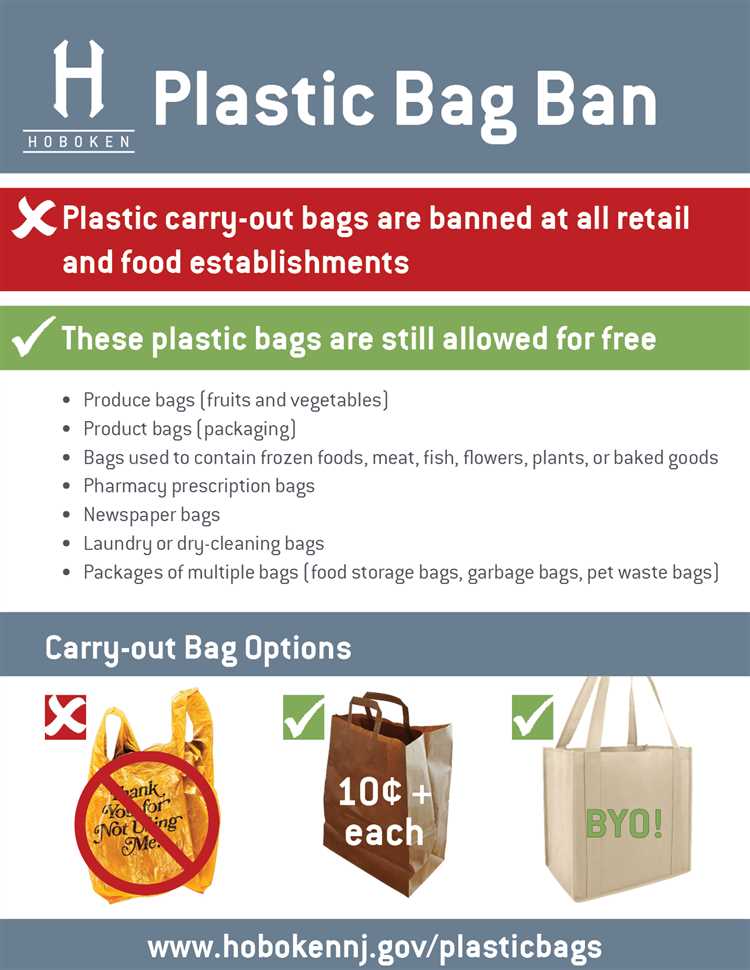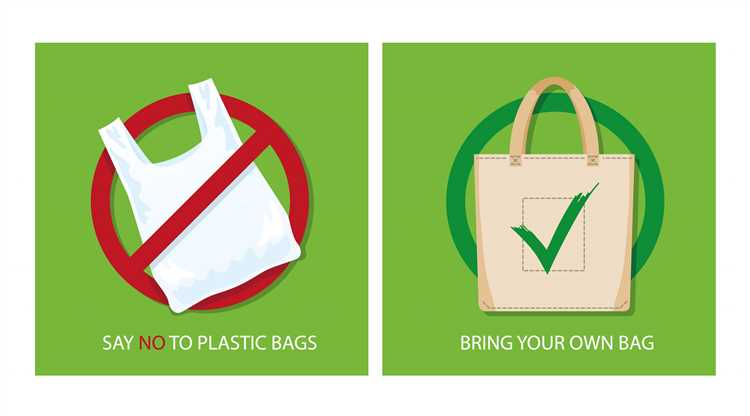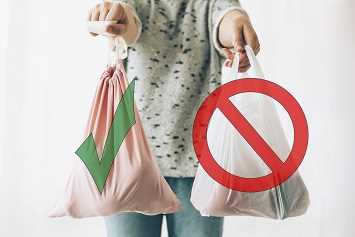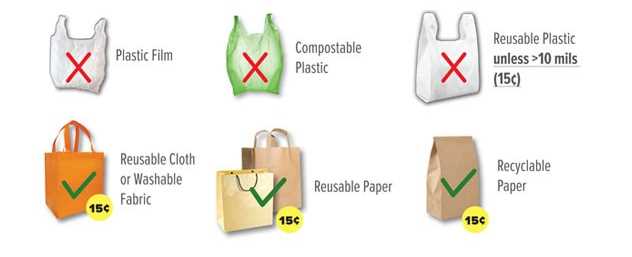
In recent years, there has been a growing concern about the impact of plastic grocery bags on the environment. Plastic bags are commonly used by consumers around the world, but their disposal is causing significant harm to our planet. As a result, many countries and cities have implemented a ban on plastic bags, encouraging the use of more sustainable alternatives.
The grocery bag ban has had a profound impact on environmental sustainability. By reducing the use of plastic bags, we are reducing the amount of waste that ends up in landfills and pollutes our oceans. Plastic bags take hundreds of years to decompose, and during that time, they release harmful chemicals into the soil and water. By switching to reusable bags, we can significantly reduce this pollution and protect our ecosystems.
Furthermore, the grocery bag ban has raised awareness about the need to reduce our plastic consumption. Plastic is made from fossil fuels, and its production contributes to greenhouse gas emissions and climate change. By making a simple change in our shopping habits and using reusable bags, we can collectively make a difference in reducing our carbon footprint and promoting a more sustainable future.
However, it is essential to recognize that the grocery bag ban is just one step towards environmental sustainability. While eliminating plastic bags is crucial, it is equally important to address other sources of plastic waste, such as packaging and single-use items. Additionally, education and awareness campaigns can play a significant role in encouraging consumers to choose more sustainable options and to properly dispose of plastic waste.
In conclusion, the grocery bag ban has had a positive impact on environmental sustainability by reducing plastic waste and raising awareness about the need for more sustainable practices. By making a small change in our shopping habits, we can contribute to a cleaner and healthier planet for future generations.
- Reduction of Plastic Waste
- Encouraging the Use of Reusable Bags
- Positive Effects on Wildlife
- Terrestrial Wildlife
- Aquatic Wildlife
- Contribution to a Cleaner Environment
- Reduction of Litter
- Protection of Wildlife
- Decrease in Landfill Space Usage
- Promotion of Sustainable Living Habits
- Education and Awareness
- Collaboration with Local Businesses
- Q&A:
- What are the main reasons for implementing a grocery bag ban?
- How does the grocery bag ban impact the environment?
- What are the alternatives to plastic bags after the ban?
- Does the grocery bag ban have any economic benefits?
- How can individuals contribute to environmental sustainability after the grocery bag ban?
- What is the grocery bag ban?
Reduction of Plastic Waste
In recent years, there has been growing concern about the impact of plastic waste on the environment. Plastics have become a major environmental issue due to their long lifespan and the difficulty of their disposal. The introduction of the grocery bag ban has been an effective measure in reducing the amount of plastic waste generated by grocery stores and consumers.
When plastic bags are banned, consumers are encouraged to bring their own reusable bags or use alternative options such as paper bags or biodegradable bags. This shift towards reusable bags significantly reduces the need for single-use plastic bags, which are a major contributor to plastic waste pollution. Furthermore, the use of reusable bags promotes responsible consumer behavior, encouraging individuals to think about their consumption and waste habits.
By reducing the use of plastic bags, the grocery bag ban helps to decrease the amount of plastic waste that ends up in landfills and the environment. Plastic bags often end up as litter, causing harm to wildlife, marine ecosystems, and contributing to microplastic pollution. By implementing the bag ban, communities have seen a significant decrease in plastic bag litter, resulting in a cleaner and healthier environment.
In addition to reducing plastic waste, the use of reusable bags also helps to conserve resources and reduce energy consumption. The production of plastic bags requires the extraction of fossil fuels and consumes a significant amount of energy. By using reusable bags, consumers can reduce their carbon footprint and contribute to a more sustainable future.
Overall, the grocery bag ban has shown promising results in reducing plastic waste and promoting environmental sustainability. It is crucial for governments, businesses, and individuals to continue promoting the use of reusable bags and implementing similar measures to further reduce the harmful impacts of plastic waste on the planet.
Encouraging the Use of Reusable Bags
Adopting reusable bags is an effective way to reduce the environmental impact of grocery bag usage. To encourage the use of reusable bags, various strategies can be implemented:
- Education and awareness campaigns: Promoting the benefits of using reusable bags through educational programs and public awareness campaigns can help shift consumer behavior. Providing information about the environmental consequences of single-use bags and the advantages of reusable alternatives can motivate individuals to make the switch.
- Incentives: Offering incentives like discounts, rewards, or loyalty points for customers who bring their own reusable bags is an effective technique. Retailers can collaborate with local governments or environmental organizations to implement such programs, which would further motivate consumers to adopt reusable bags.
- Availability and accessibility: Ensuring the availability and accessibility of reusable bags in grocery stores and other retail outlets is crucial. Displaying reusable bags prominently and offering them at affordable prices can make it easier for consumers to transition away from single-use bags.
- Partnerships with organizations: Collaborating with environmental organizations and community groups can help promote the use of reusable bags. Retailers can partner with these organizations to organize events, workshops, or distribution programs that educate and encourage consumers to start using reusable bags.
- Government regulations: Implementing government regulations, such as a ban on single-use bags or imposing fees on their usage, can significantly influence consumer behavior. These regulations can create a sense of urgency and necessity for individuals to switch to reusable bags.
By adopting these strategies, individuals, retailers, and governments can collectively work towards reducing the environmental impact of grocery bag usage and promoting a sustainable future.
Positive Effects on Wildlife

Grocery bag bans have had a positive impact on wildlife, both in terrestrial and aquatic ecosystems. By reducing the use of single-use plastic bags, these bans have helped to decrease the amount of litter that ends up in natural habitats.
Terrestrial Wildlife
Wildlife found on land, such as birds, mammals, and reptiles, have benefited from the grocery bag ban. Plastic bags are often mistaken for food by animals, especially birds, who may ingest them and suffer from digestive issues or even death. The reduction in the availability of plastic bags has significantly decreased this risk, leading to healthier populations of terrestrial wildlife.
In addition, plastic bags can also pose a physical threat to animals. Animals can become entangled in them, hindering their movement and potentially causing injury or death. With fewer plastic bags in the environment, the likelihood of these accidents occurring has been reduced, preserving the well-being of terrestrial wildlife.
Aquatic Wildlife
Aquatic ecosystems, such as rivers, lakes, and oceans, have also reaped the benefits of grocery bag bans. When plastic bags end up in water bodies, they pose a significant hazard to marine life. Sea turtles, for example, often mistake plastic bags for jellyfish and consume them, leading to intestinal blockages and fatal consequences. By reducing the use of plastic bags, the grocery bag ban has contributed to the protection of marine species.
Furthermore, the presence of plastic bags in water bodies can cause indirect harm to aquatic wildlife. As plastic bags break down, they release microplastics into the water, which can be ingested by fish and other marine organisms. These microplastics can accumulate in the food chain, ultimately affecting larger predators and even humans. The decrease in plastic bag usage has helped to minimize this pollution and its potential harm to aquatic wildlife.
| Positive Effects on Wildlife: | |
|---|---|
| Reduced ingestion of plastic bags by birds and animals | Preservation of well-being |
| Decreased risk of entanglement in plastic bags | Protection of marine life |
| Minimized pollution from microplastics |
In conclusion, the grocery bag ban has had a positive impact on wildlife by reducing the risks posed by single-use plastic bags. Both terrestrial and aquatic wildlife have benefited from these bans and are now better protected from the harmful effects of plastic pollution.
Contribution to a Cleaner Environment
The ban on grocery bags has had a significant impact on the overall cleanliness of our environment. By reducing the use of single-use plastic bags, we have seen a decrease in litter and pollution in our neighborhoods, parks, and waterways. This reduction in waste has helped to protect wildlife and preserve the natural beauty of our surroundings.
Reduction of Litter
One of the most noticeable changes since the implementation of the grocery bag ban is the decrease in litter on our streets and public spaces. Single-use plastic bags were one of the most common forms of litter, as they were easily carried by the wind and often ended up in trees, bushes, and water bodies. By eliminating their use, we have significantly reduced the amount of plastic waste that accumulates in our communities.
In addition to the physical clutter caused by plastic bags, their presence also had a negative impact on the perception and reputation of our neighborhoods. Streets and parks filled with discarded bags gave an image of neglect and carelessness. Without the constant presence of plastic bags, our communities appear cleaner and more inviting to residents and visitors alike.
Protection of Wildlife

The ban on grocery bags has also had a positive impact on wildlife conservation. Marine animals, in particular, were severely affected by single-use plastic bags, as they easily found their way into rivers, lakes, and oceans. These bags were often mistaken for food by marine creatures, leading to choking, entanglement, and ultimately death.
With the reduction in plastic bags, the risk to marine life has significantly decreased. Our water bodies are cleaner, making it easier for wildlife to forage for food and find safe habitats. This, in turn, helps to maintain the delicate balance of ecosystems and protect endangered species.
Furthermore, the ban on grocery bags has also highlighted the importance of responsible waste management among the population. People are now more conscious of the impact their actions have on the environment and are more likely to dispose of their waste properly, ensuring that it doesn’t end up in the habitats of wildlife.
| Benefits of the Grocery Bag Ban | Examples |
|---|---|
| Reduction of litter in streets and public spaces | Cleaner parks and neighborhoods |
| Protection of wildlife and preservation of ecosystems | Decreased risk of marine animal entanglement |
| Promotion of responsible waste management practices | Improved understanding of environmental impact |
In conclusion, the ban on grocery bags has made a significant contribution to a cleaner environment. It has reduced litter, protected wildlife, and encouraged responsible waste management. As we continue to prioritize environmental sustainability, it is important to build on these achievements and seek additional ways to reduce our ecological footprint.
Decrease in Landfill Space Usage
One of the significant impacts of the grocery bag ban on environmental sustainability is the decrease in landfill space usage. Landfills are commonly used to dispose of plastic bags, which can take hundreds of years to decompose. With the implementation of the bag ban, the usage of plastic bags has significantly reduced, leading to a decrease in the amount of plastic waste that ends up in landfills.
This decrease in landfill space usage has several benefits for the environment. First and foremost, it helps to conserve valuable land resources. Landfills take up enormous amounts of space, and as urban areas continue to expand, finding suitable land for waste disposal becomes increasingly challenging. By reducing the amount of plastic waste going to landfills, the grocery bag ban helps to alleviate this issue and conserve land for other purposes.
Furthermore, reducing landfill space usage also has a positive impact on greenhouse gas emissions. When organic waste, such as food scraps, are buried in landfills, they break down and release methane, a potent greenhouse gas. By decreasing the amount of plastic bags in landfills, the bag ban indirectly helps to reduce methane emissions and mitigate climate change.
Additionally, the decrease in landfill space usage contributes to a cleaner and healthier environment. Landfills can contaminate the soil and groundwater with toxic chemicals and pollutants, posing a threat to wildlife and human health. By reducing the amount of plastic waste going to landfills, the grocery bag ban helps to minimize these environmental risks and create a safer ecosystem for all.
Promotion of Sustainable Living Habits
Implementing a grocery bag ban not only encourages the use of reusable bags, but also promotes sustainable living habits in general. This ban serves as a reminder to individuals to consider the environmental impact of their choices and make more conscious decisions in their everyday lives.
By eliminating single-use plastic bags, communities are given the opportunity to explore alternative methods of transportation. The ban encourages individuals to walk or use bicycles instead of driving. This not only reduces air pollution, but also provides health benefits by promoting physical activity.
Education and Awareness
Alongside the ban, educational campaigns can be implemented to raise awareness about the importance of sustainable living habits. These campaigns can include workshops, community events, and informational materials that highlight the positive impact of choosing reusable bags and other eco-friendly alternatives.
These educational initiatives can empower individuals to make informed choices about their shopping habits and motivate them to reduce their overall consumption. By emphasizing the benefits of reusable bags and other sustainable choices, the campaigns can encourage a shift towards more eco-conscious behaviors.
Collaboration with Local Businesses

Local businesses can play a vital role in promoting sustainable living habits within a community. By offering incentives for using reusable bags, such as discounts or loyalty points, businesses can encourage customers to adopt sustainable practices.
Additionally, businesses can partner with environmental organizations to host events or workshops that focus on sustainable living. This collaboration can create a sense of community and shared responsibility for the environment, further motivating individuals to make environmentally conscious choices.
In conclusion, the grocery bag ban not only reduces plastic waste, but also has a wider impact on promoting sustainable living habits. By raising awareness, providing education, and collaborating with local businesses, communities can work together to create a more sustainable future.
Q&A:
What are the main reasons for implementing a grocery bag ban?
The main reasons for implementing a grocery bag ban are to reduce plastic waste, protect the environment, and promote sustainability. Single-use plastic bags are a major contributor to pollution and harm wildlife.
How does the grocery bag ban impact the environment?
The grocery bag ban has a positive impact on the environment by reducing the amount of plastic waste generated. This helps to prevent pollution and protect ecosystems. Additionally, it helps to conserve resources by promoting the use of reusable bags.
What are the alternatives to plastic bags after the ban?
After the grocery bag ban, alternatives to plastic bags include reusable bags made of cloth, canvas, or recycled materials. Some stores also offer paper bags or encourage customers to bring their own bags. These alternatives are more sustainable and can be used multiple times.
Does the grocery bag ban have any economic benefits?
Yes, the grocery bag ban can have economic benefits. By reducing the use of single-use plastic bags, the cost of production and disposal of these bags decreases. Additionally, reusable bags are a one-time investment for consumers and can save money in the long run.
How can individuals contribute to environmental sustainability after the grocery bag ban?
After the grocery bag ban, individuals can contribute to environmental sustainability by using reusable bags for shopping, reducing their overall consumption and waste, and participating in recycling programs. They can also spread awareness about the importance of sustainable practices to their friends and family.
What is the grocery bag ban?
The grocery bag ban refers to the restriction or prohibition on the use of single-use plastic bags in grocery stores or other retail establishments.